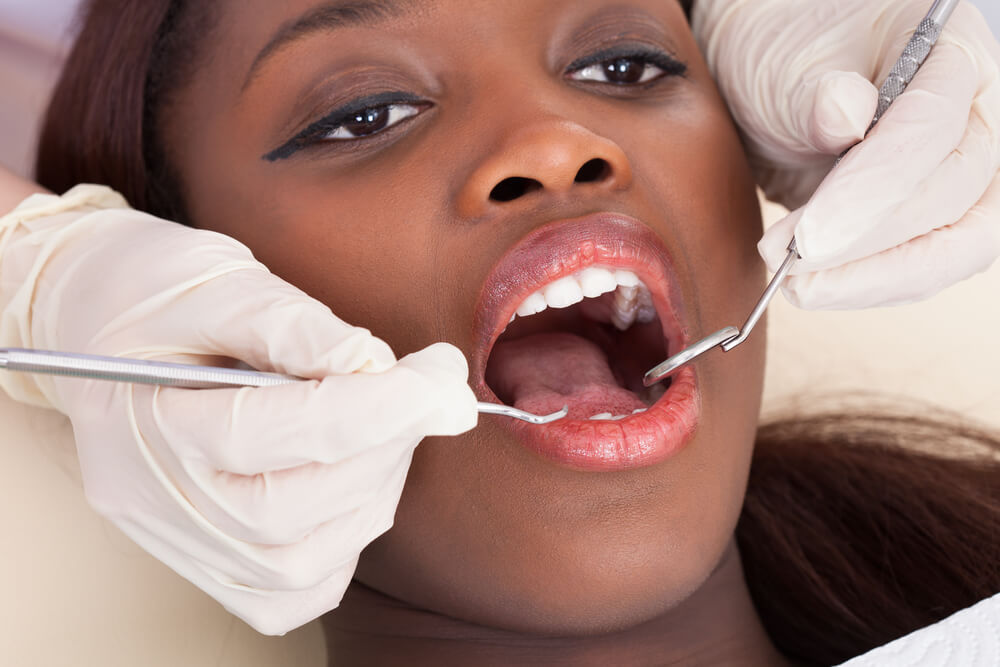Keeping your teeth clean and mouth healthy can increase your overall physical and mental health. On top of the numerous things you can do at home to clean your teeth, it’s also a good idea to visit a dentist for routine cleanings. However, many people are hesitant to get their teeth cleaned due to the cost.
Teeth Cleaning Cost
The average teeth cleaning cost in the UK varies depending on where you go and how intense the cleaning or other procedures are. There are multiple pricing “bands” or tiers if you go to a National Health Service (NHS) dentist.
Band 1, the most rudimentary dental appointment, includes a dental exam and diagnosis. This band also covers basic tooth cleaning, known as scale and polish, and x-rays. This appointment costs £22.70.
If your teeth cleaning reveals cavities, you may require further treatment. Band 2 at the NHS contains everything in Band 1, as well as fillings, root canals, and tooth extraction. This appointment costs £62.10.
If your teeth are to the point of needing serious work, you may have to bump to Band 3. It includes all of the above, as well as more involved procedures like crowns and dentures. This appointment costs £269.30.
If you need additional treatment within 60 days of a previous appointment, you will not be charged again by the NHS as long as the new work is within the same band.
For some in the UK, there is no payment required. These groups include:
- Children (under the age of 18)
- Pregnant women
- Postpartum women up to 1 year after giving birth
- Anyone receiving low-income benefits or a dependent of someone receiving these benefits
Many dentists in the UK offer both private and NHS pricing, though. For a routine scale and polish, you can expect to pay between £25 and £85. Many dentists will want to take x-rays for an additional £5 to £40, or charge a new patient fee between £20 and £120. Without the regulation of the NHS, private fees can rack up quickly, depending on the work done.
What happens during a teeth cleaning?
When heading to the dentist, knowing what to expect will help ease fears and tension surrounding the appointment. Of course, knowing the teeth cleaning cost ahead of time will also do this. So, here’s exactly what to expect at a teeth scaling and polishing appointment.
- A dental hygienist will do a quick physical exam of your mouth. They will look for any major concerns, like inflamed gums, redness, swelling, or tender teeth. At this point, they may ask the dentist to consult or will wait until after the scale and polish.
- What is a scale and polish? This is when the dental hygienist scrapes plaque and tartar from your teeth with metal tools or an electric instrument. The high vibrations of motorized instruments remove tartar from teeth, then the hygienist will use water to spray it away. They may ask you to spit at times or have a suction machine in your mouth as well.
- Removing tartar can leave teeth exposed where they have not been in a while. The rough surface is the perfect trap for plaque, so the hygienist will polish these spots specifically to protect against future tartar build-up. To polish, the hygienist will use an electric buff and polish to help protect your teeth.
- Next, the dental hygienist will floss your teeth. Often, if you have not kept up on your dental routine, your gums will bleed during this step. This is common and could be a sign of gingivitis.
- Finally, the dentist may apply a coat of fluoride. During this step, you will have a foam applied to your upper and lower teeth for a minute or two. This provides an additional protective coat to your teeth enamel.
Tips for Cleaning Your Teeth
It is crucial to have a regular teeth cleaning routine at home for optimal oral health. Brush your teeth twice a day, for two full minutes each time, preferably when you get up in the morning and after dinner. Floss at least once a day too. Using a regular mouthwash can also go great lengths to improve oral health and keep teeth white.
But, never try to scale and polish your teeth at home. Scraping with metal to get plaque and tartar off should only be done by professionals. A misstep can permanently damage your teeth by removing a layer of enamel, increasing the likelihood of sensitivity and decay.
There are safe ways to whiten your teeth at home, but you should consult your dentist for the best product given your teeth and the exact stains you have.
All in all, taking care of your teeth at home will keep dental costs down by having a healthy mouth.
